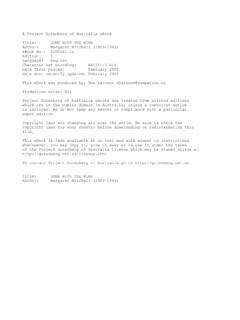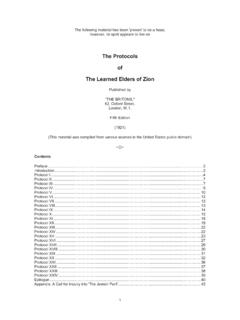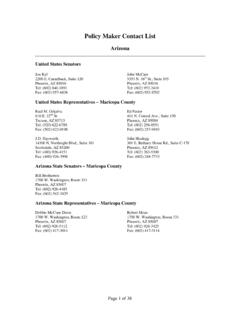Transcription of THE LITTLE RED BOOK OF CHAIRMAN MAO - Campbell M …
1 1 THE LITTLE RED book OF CHAIRMAN MAO Quotations from CHAIRMAN Mao Tse-tung 1927 - 1964 Commonly known as the " LITTLE Red book ", the original collection of CHAIRMAN Mao s (1893-1976) quotations was first published in China in May 1964 This material has been reconstructed from various unverified sources CMG Archives --()-- 2 Contents Contents .. 2 2 Chapter 1 - The Communist Party .. 5 Chapter 2 - Classes and Class Struggle .. 6 Chapter 3 - Socialism and Communism .. 10 Chapter 4 - The Correct Handling of Contradictions Among the People .. 14 Chapter 5 - War and Peace .. 18 Chapter 6 - Imperialism and All Reactionaries are Paper 21 Chapter 7 - Dare to Struggle and Dare to Win .. 23 Chapter 8 - The People's War .. 24 Chapter 9 - The People's Army .. 27 Chapter 10 - Leadership of Party 28 Chapter 11 - The Mass 31 Chapter 12 - Political Work.
2 34 Chapter 13 - Relations Between Officers and Men .. 37 Chapter 14 - Relations Between the Army and the People .. 38 Chapter 15 - Democracy in the Three Main Fields .. 39 Chapter 16 - Education and the Training of Troops .. 41 Chapter 17 - Serving the People .. 42 Chapter 18 - Patriotism and Internationalism .. 43 Chapter 19 - Revolutionary Heroism .. 44 Chapter 20 - Building Our Country Through Diligence and Frugality .. 45 Chapter 21 - Self-Reliance and Arduous Struggle .. 47 Chapter 22 - Methods of Thinking and Methods of Work .. 49 Chapter 23 - Investigation and Study .. 55 Chapter 24 - Correcting Mistaken Ideas .. 56 Chapter 25 - Unity .. 59 Chapter 26 - Discipline .. 60 Chapter 27 - Criticism and Self-Criticism .. 61 Chapter 28 - Communists .. 63 Chapter 29 - Cadres .. 65 Chapter 30 - Youth .. 68 Chapter 31 - Women .. 69 Chapter 32 - Culture and Art.
3 70 Chapter 33 - Study .. 71 Note: In the following text, hash "#", indicates that the quotation links to the previous text. --()-- Introduction Mao Tse-tung was born 26 December 1893, in Shao-shan, Hunan province, China, of a prosperous peasant farming family - his mother was a devout Buddhist. 3 (Mao Tse-tung - 1893-1976) Mao attended primary school, where he studied traditional Confucian classics. Later, he became a Marxist while he was working as a library assistant at Peking University During the 1911 Chinese Revolution, Mao briefly served in the revolutionary army. Mao was a founding member of the Chinese Communist Party, and a Chinese soviet was founded in Juichin, Kiangsi province, with Mao as CHAIRMAN . Chiang Kai-shek's Nationalist government implemented a series of extermination campaigns and forced the Chinese Communist Party to leave Juichin in 1934.
4 This started the "Long March" and the Communist forces reached Shensi, October 1935 (a march of 10,000 km), and this marked the end of Russian involvement in Chinese communism. The Japanese invasion of china during the Second World War necessitated the Chinese Communist Party and the Kuomintang to form a united front. Consequently, Mao rose in political power and in stature as a national leader; and under Mao's governance, the Chinese Communist Party membership rose from 40,000 members in 1937 to 1,200,000 members in 1945. Following the end of the Second World War, the united front collapsed and civil war ensued. The Chinese Communist Party came to power and Chiang's government escaped to Taiwan. When the United States refused to recognise Mao, he developed a close alliance with Russia. During the early 1950s, Mao served as CHAIRMAN of the Communist party, chief of state, and CHAIRMAN of the military commission.
5 Mao's sayings, printed in a LITTLE red book , were distributed during the Cultural Revolution. Mao Tse-tung died in Peking on 09 September 1976. Brief Timeline 1930 - Mao writes "A Single Spark Can Start a Prairie Fire" 1945 - Chinese civil war begins, Chiang Kai-Shek vs. Mao Tse-tung 1948 - Mao' army occupies Yenan 1949 - 01 October, China adopts the Gregorian calendar after a declaration by Mao 1949 - Chinese Communist insurgents led by Mao take power 1949 - Mao's Red army conquers Ten-tsin 1949 - People's Republic of China proclaimed by Mao (National Day) 1958 - Mao commences the "Great leap forward" movement in China 1963 - Mao writes his poem "Reply to Comrade Kuo Mo-jo" 4 1976 - Final meeting between Mao and Richard Nixon 1976 - 09 September, Mao dies in Peking 1976 - Hua Guo-feng succeeds Mao Tse-tung as CHAIRMAN of Communist Party 1981 - China's Communist Party condemns the late Mao Tse-tung's policies 1981 - Mao's widow Jiang Qing sentenced to death 5 Chapter 1 The Communist Party The force at the core leading our cause forward is the Chinese Communist Party.
6 The theoretical basis guiding our thinking is Marxism-Leninism. Opening address at the First Session of the First National People's Congress of the People's Republic of China (September 15, 1954). If there is to be revolution, there must be a revolutionary party. Without a revolutionary party, without a party built on the Marxist-Leninist revolutionary theory and in the Marxist-Leninist revolutionary style, it is impossible to lead the working class and the broad masses of the people in defeating imperialism and its running dogs. "Revolutionary Forces of the World Unite, Fight Against Imperialist Aggression!" (November 1948), Selected Works, Vol. IV, p. 284. # Without the efforts of the Chinese Communist Party, without the Chinese Communists as the mainstay of the Chinese people, China can never achieve independence and liberation, or industrialization and the modernization of her agriculture.
7 "On Coalition Government" (April 24, 1945), Selected Works, Vol. III, p. 318. # The Chinese Communist Party is the core of leadership of the whole Chinese people. Without this core, the cause of socialism cannot be victorious. Talk at the general reception for the delegates to the Third National Congress of the New Democratic Youth League of China (May 25, 1957). A well-disciplined Party armed with the theory of Marxism-Leninism, using the method of self-criticism and linked with the masses of the people; an army under the leadership of such a Party; a united front of all revolutionary classes and all revolutionary groups under the leadership of such a Party - these are the three main weapons with which we have defeated the enemy. "On the People's Democratic Dictatorship" (June 30, 1949), Selected Works, Vol. IV, p. 422. We must have faith in the masses and we must have faith in the Party.
8 These are two cardinal principles. If we doubt these principles, we shall accomplish nothing. On the Question of Agricultural Co-operation (July 31, 1955), 3rd ed., p. 7. # Armed with Marxist-Leninist theory and ideology, the Communist Party of China has brought a new style of work to the Chinese people. A style of work which essentially entails integrating theory with practice, forging close links with the masses and practicing self-criticism. "On Coalition Government" (April 24, 1945), Selected Works, Vol. III, p. 314. # No political party can possibly lead a great revolutionary movement to victory unless it possesses revolutionary theory and knowledge of history and has a profound grasp of the practical movement. "The Role of the Chinese Communist Party in the National War" (October 1938), Selected Works, Vol. II, p. 208. As we used to say, the rectification movement is "a widespread movement of Marxist education".
9 Rectification means the whole Party studying Marxism through criticism and self-criticism. We can certainly learn more about Marxism in the course of the rectification movement. Speech at the Chinese Communist Party's National Conference on Propaganda Work (March 12, 1957), 1st pocket ed., p. 14. 6 It is an arduous task to ensure a better life for the several hundred million people of China and to build our economically and culturally backward country into a prosperous and powerful one with a high level of culture. And it is precisely in order to be able to shoulder this task more competently and work better together with all non-Party people who are actuated by high ideals and determined to institute reforms that we must conduct rectification movements both now and in the future, and constantly rid ourselves of whatever is wrong. Ibid., pp. 15-16. # policy is the starting-point of all the practical actions of a revolutionary party and manifests itself in the process and the end-result of that party's actions.
10 A revolutionary party is carrying out a policy whenever it takes any action. If it is not carrying out a correct policy , it is carrying out a wrong policy ; if it is not carrying out a given policy consciously, it is doing so blindly. What we call experience is the process and the end-result of carrying out a policy . Only through the practice of the people, that is, through experience, can we verify whether a policy is correct or wrong and determine to what extent it is correct or wrong. However, people's practice, especially the practice of a revolutionary party and the revolutionary masses, cannot but be bound up with one policy or another. Therefore, before any action is taken, we must explain the policy , which we have formulated in the light of the given circumstances, to Party members and to the masses. Otherwise, Party members and the masses will depart from the guidance of our policy , act blindly and carry out a wrong policy .






